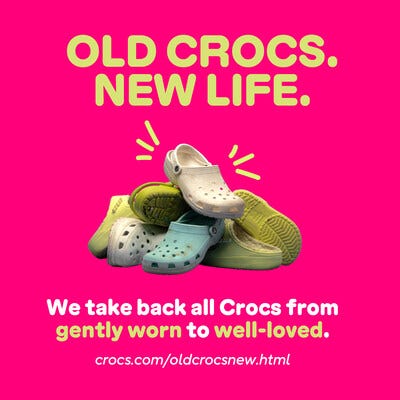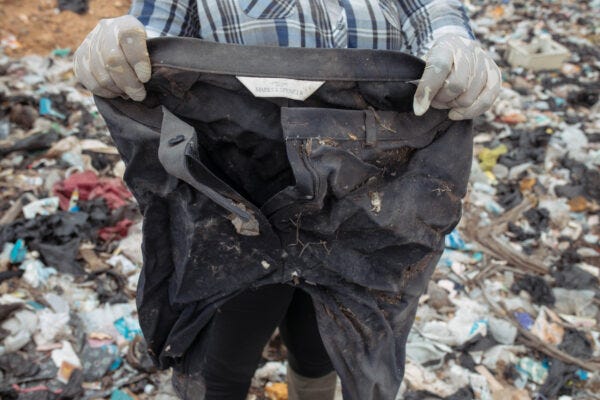La Impact Weekly: Week of June 16th 2025
EU rollercoaster, sad SME news, lots of innovations though, and some good reports and podcasts to check out
Hello sustainable fashion enthusiasts,
Welcome to this week's edition of La Impact Weekly, your weekly sustainable fashion download. 📰🌍
Here is a quick recap (with more details below):
Brand & Industry Moves
- 🫒 ECOALF secures €7M sustainability loan to fuel global expansion.
- 🫒 HEMPER enters liquidation after 9 years, citing "growing complexity" for independent purpose-driven brands.
- 🫒 The White Company joins Cotton Lives On™ recycling initiative, repurposing unwearable cotton into roll mats for homeless individuals.
- SWAROVSKI launches Chroma Twist collection with reversible crystals and adjustable designs developed with Centre for Sustainable Fashion.
- Crocs, Inc. expands takeback program to bring to the UK and Europe.
- Vogue launches year-long 'Vogue Values' initiative with eBay and Nike spotlighting sustainability and representation.
- Better Cotton aims to transition to regenerative agriculture standard within 12 months.
- Coach Foundation doubles investment to $20M for youth scholarships.
.
Fashion Tech & Sustainability Innovation
- Circulose partners with MANGO as first Scaling Partner for large-scale textile-to-textile recycling adoption targeting 2030 fiber goals.
- Reju scales circular polyester production through Utexa and Antex partnerships.
- The Woolmark Company introduces QuantumCOLOUR™ dry dyeing with water efficient COLOURizd.
- Fashion for Good launches Altag® Fibre Club with AltMat for agricultural waste-based fibers.
- Hyosung Corporation transitions bio-based spandex from corn to sugarcane feedstock.
.
Regulatory & Policy Shifts
- European Commission withdraws Green Claims Directive just days before finalization (featured below 👇).
- EFRAG cuts sustainability reporting datapoints by 50%+ targeting "too granular" requirements while preserving CSRD core objectives.
- EU Parliament exempts 90% of importers from carbon border tax through 50-tonne threshold while maintaining 99% emissions coverage.
Every week. So. Many. News. Get them delivered into your inbox every week.
La Featured News: Yet another sustainability rollback from the EU, this time on greenwashing
La Backdrop
Seriously? We had to grieve the Omnibus proposal, and now this? Come on EU…

This is the latest in what's becoming a depressing series of rollbacks from the EU (see recent changes by EFRAG and on CBAM below in other news). To recap, in case you don’t mind getting depressed:
February 2025. Omnibus Proposal I gutted sustainability reporting requirements by limiting the Corporate Sustainability Reporting Directive (CSRD) to only companies with more than 1,000 employees (down from 250), pushed back deadlines by two years, and slashed required data points. We went from around 50,000 companies having to report to just 10,000.
May 23, 2025. Then, it seemed like things might be looking up. The EU Ombudswoman opened an investigation into these proposals because the Commission apparently skipped key procedural requirements like public consultation and impact assessments.
Last week (June 2025). EU Parliament's lead negotiator Jörgen Warborn (EPP) proposed even deeper cuts, raising the threshold to 3,000 employees and €450Mn in revenue, plus limiting mandatory data points to just 100 (down from potentially thousands). This would reduce the number of affected companies to maybe just a few thousand of the largest EU corporations.
So, things have been a roller coaster, but mostly trending down. Though, you cannot blame a girl for staying hopeful, right?

Some quick history:
The Green Claims regulations started in March 2023 with the expectation that it would set minimum criteria that companies need to meet when making claims to consumers about the environmental benefits and performance of their products or services. It happened after several European countries had already implemented green claims regulations, including France's Climate and Resilience Law (August 2021), the Netherlands' Guidelines on Sustainability Claims (January 2021), and Germany's evolving case law on climate neutrality claims.
Now, the EU has decided that it would go after part of its anti-greenwashing regulation.
.
Los Details
The European Commission announced its intention to withdraw the proposed Green Claims Directive just days before crucial trilogue negotiations, following objections from the European People's Party (EPP) (this is another Swedish MEP, Arba Kokalari), the largest political group in the EU Parliament. Technically, it hasn't been formally withdrawn yet, but the Commission has confirmed it will be.
The EPP argued in a letter that the directive would be "overly complex, administratively burdensome, and costly," lacking proper cost-benefit analysis and featuring an unprecedented pre-approval mechanism for environmental claims.

The directive aimed at tackling misleading green claims after an EU led study showed over half of such claims in the EU were vague or misleading (and with 19% of consumer explicitly distrusting sustainability claims). The withdrawal has been frustrating, especially to negotiators who were nearing a successful conclusion to two years of deliberations.

But, anti-greenwashing is not dead in the EU. You see, there are two parts to this:
ECGT Directive (the "blacklist" approach): This already-in-force directive (proposed March 2022, entered into force March 2024) straight-up bans certain misleading practices. For example:
Generic green claims like “eco-friendly” or “sustainable” are banned unless backed by clear, verifiable evidence
Companies cannot claim “carbon neutral” if it relies only on offsetting without reducing emissions
Only officially recognized or third-party verified sustainability labels are allowed
Products must clearly state how long they are expected to last and whether they can be repaired
Practices that shorten a product’s lifespan on purpose are prohibited
Green Claims Directive (the "proactive compliance" approach): This was the proposed verification system that is being withdrawn, the "show your work" requirement. For example:
Companies must back up green claims with scientific evidence, like a life cycle analysis
Claims must clearly say what part of the product they cover and what stage of its life
Comparisons between products must be based on fair, equivalent data
All green claims must be checked by an independent verifier before going public
Only approved or certified sustainability labels will be allowed
Misleading or vague claims will not be permitted
You’re still with me? So basically, we still have the first part. For now.
.
Mi Take
The EU has been the beacon of hope for me when it comes to sustainability regulations. Always with the expectation that they would lead and the US would follow. Unfortunately, these days, the opposite is happening. The US is retracting, and the EU is following us. But, please, don't.
Maybe it’s the hopeful one in me, but I don’t think this is as bad as the CSRD or CSDDD rollbacks. There's still some regulation on the books that stops companies from making up certifications and using broad terms.
Plus, there are still greenwashing regulations in other countries. The UK has both their Green Claims Code, plus the recent big news: the Digital Markets, Competition and Consumers Act 2024 came into full force in April 2025, giving the Competition and Markets Authority (CMA) new powers to directly fine companies up to 10%(!!!) of global turnover for greenwashing without needing court approval. France has AGEC and its Climate and Resilience Law, plus brought cases against companies like Lululemon for misleading environmental claims. Germany's Federal Court of Justice ruled in June 2024 that "climate neutral" claims are misleading without clear explanations of emission reduction vs. compensation. Just this March 2025, the Nuremberg-Fürth Regional Court found Adidas guilty of greenwashing for failing to detail how it would achieve "climate neutrality" by 2050, notably targeting broad corporate sustainability strategy rather than specific product claims. Other countries are following suit such as Canada, Australia, Italy, and so on. So it's not like the world is going backwards on this front.
It seems that EU is maybe trying to copy the US federalism playbook: let individual countries do their own thing with minimal central oversight. But here's the thing: the EU itself claims that fragmentation at the country level risks competing systems and regulatory uncertainty, getting on the way of a unified market (in the original CSDDD document). So what changed? Aren’t the principles the same? Or are we caving to mirror the politics across the pond?
It just makes things more complicated for brands. As Lauren Bartley, GANNI’s CSO, puts it:
If the Green Claims Directive is pulled back, it only adds to the confusion brands are already facing. (…) We’re being asked to communicate sustainability with more accuracy and accountability, which is absolutely right, but without clear, consistent frameworks, it becomes a minefield.
This is the turbulent time we have all been expecting. As someone who does not like flying at all, I can tell you that turbulence sucks, but, most of the time, you end up with a smooth flight afterwards. We’'ll get through this. In the meantime, buckle up.
And, I don’t know about you, but I really hope that ESPR isn’t next.
What do you think: is it all downhill from here? Or is this just temporary? Leave a comment below and let me know your thoughts.
Last week’s news
Brand & Industry Moves
🫒 Ecoalf secures €7Mn sustainability loan. Spanish sustainable fashion company Ecoalf has sealed a €7Mn loan with impact fund manager Impact Bridge to fuel global expansion. The financing comes through the IB Deuda Impacto España fund, which specializes in projects with social and environmental impact in Spain. The loan includes commitments beyond financing to strengthen Ecoalf's social impact and promote a more sustainable economic model. Read more.
🫒 Hemper enters liquidation after nine years. Madrid-based sustainable fashion brand Hemper filed for creditor bankruptcy and liquidation in April 2025, facing €447,000 in liabilities. The hemp-focused brand, founded in 2016 after a volunteer trip to Nepal, achieved B Corp certification in 2019 and collaborated with major retailers like Springfield on Fair Trade collections. The company cited the "growing complexity" for independent purpose-driven brands as the reason for closure. A bid for asset acquisition has been presented alongside the liquidation request. Read more.
🫒 The White Company joins cotton recycling initiative. British home and lifestyle brand The White Company announced its participation in the Cotton Lives On recycling program during its inaugural Sustainability Week. The initiative repurposes unwearable cotton textiles into roll mats for individuals facing homelessness, joining UK brands like Whistles, Anthropologie, and ME+EM. Since its 2022 UK launch, the program has collected nearly 8,000kg of cotton and produced over 100 mats. Read more.
Swarovski launches circular Chroma Twist collection. Austrian jewelry house Swarovski unveiled the Chroma Twist collection, designed with circular design principles developed in partnership with the Centre for Sustainable Fashion at the University of the Arts London. The six-piece collection features lower-impact materials including Swarovski ReCreated™ Crystals and recycled metals, with pieces designed to switch crystal colors and adapt styles for increased longevity. Read more.
Crocs expands takeback program to Europe. Crocs expanded its 'Old Crocs. New Life' takeback program to the UK, Germany, France, Austria, and the Netherlands with collection boxes at retail and outlet locations. The program partners with FastFeet Grinded for recycling in Europe, while donated US shoes have been repurposed into the brand's first recycled footwear, the 'Keep It Going Recycled Classic Clog' made with 25% post-consumer recycled materials. Read more.
Vogue launches 'Vogue Values' initiative. British Vogue has partnered with eBay and Nike on a year-long program exploring fashion's impact on transformation and inclusion. The initiative spotlights sustainability, women's health, equitable access to creativity, and representation through editorial features and events. The inaugural "Fashion is for Everyone" campaign features model Jourdan Dunn and collaborates with charities Smart Works and Give Your Best. Read more.
Better Cotton to become regenerative agriculture standard. Better Cotton announced it will complete its transition to become a regenerative standard within the next 12 months during its 2025 conference in Izmir, Turkey. The organization is revising its Principles & Criteria and developing an outcome-based reporting framework to ensure farmers adopt commonly agreed regenerative practices. Better Cotton previously piloted regenerative methods with 7,000 farmers in Telangana, India, resulting in increased productivity and reduced costs. Read more.
Coach doubles investment in youth scholarships. Coach Foundation announced a $20Mn investment to expand its 'Dream It Real' scholarship program for students, nearly doubling its commitment. The program aims to award 10,000 scholarships by 2030 and has already provided more than 7,000 globally. Key outcomes show 97% of participants are on track to graduate college on time, compared to the 21% national average for similar backgrounds. Read more.
Sustainability Innovation Updates
Circulose partners with Mango. Textile recycling company Circulose has partnered with Mango as its first Scaling Partner since restarting operations, marking a shift from limited capsule collections to large-scale adoption. The collaboration supports Mango's goal to “exclusively use fibers with lower environmental impact by 2030,” with the brand committing to shift a meaningful share of their man-made cellulosic fiber use to CIRCULOSE® made from 100% discarded textiles. Read more.
Reju scales circular polyester production with Utexa and Antex partnerships. Polyester textile-to-textile recycler Reju has formed strategic partnerships with multifilament yarn manufacturers Utexa and Antex to commercialize and scale its REJU Polyester™ technology. Production has already begun at Utexa's Honduras facility and Antex's Spanish plant in Girona, with the circular polyester being incorporated into high-performance multifilament yarns. Read more.
Woolmark partners with COLOURizd for dry wool dyeing. Woolmark, the global authority on wool promotion and quality standards, has teamed up with COLOURizd™ to introduce QuantumCOLOUR™, a revolutionary yarn coloring process for wool and wool blends. The technology uses just 0.5L of water per kilogram of yarn compared to traditional dyeing's 60-120 liters, eliminating wastewater discharge and the need for bleaching. Read more.
Fashion for Good launches Altag® Fibre Club. Fashion for Good has partnered with materials science company Altmat to launch the Altag® Fibre Club, designed to accelerate commercial adoption of next-generation fibers made from agricultural waste. The initiative brings together a consortium of supply chain partners including Adalberto, Alok, Arvind, and Shahi Exports to integrate Altmat's fibers into mainstream production. The club builds on Fashion for Good's successful 2024 Fibre Club with textile recycler Circ. Read more.

Hyosung transitions bio-based spandex from corn to sugarcane. The world's largest spandex producer is upgrading its regen™ BIO Spandex feedstock from corn to sugarcane-derived bio-BDO, citing higher yields, better carbon sequestration, and renewable energy from bagasse byproducts. Production at Hyosung's Vietnam plant is expected to start in the first half of 2026 with potential output of 50,000 tons annually, delivering 27% lower carbon footprint than conventional spandex. Read more.
EU textile recyclers urge Parliament to fast-track waste directive vote. The T2T Alliance and seven European waste organizations are calling on the EU Parliament to end delays on the revised Waste Framework Directive vote, postponed until October 2025. The four-month delay stalls Extended Producer Responsibility implementation, putting textile recycling investments and scaling partnerships on hold. The coalition argues Europe cannot afford to wait until October for essential circular economy legislation. Read more.
.
Regulatory and Policy Shifts
EFRAG cuts sustainability reporting requirements. The European Financial Reporting Advisory Group (EFRAG), which develops technical advice for EU sustainability reporting standards, announced plans to reduce datapoints in the European Sustainability Reporting Standards (ESRS) by more than half. The ESRS are the standards that determine what companies must disclose under the Corporate Sustainability Reporting Directive (CSRD). The organization expects to publish exposure drafts in July with final advice delivered to the Commission by October 2025. Read more.
EU agrees to exempt 90% of importers from carbon border tax. The European Parliament and Council reached an agreement to introduce a new threshold to the Carbon Border Adjustment Mechanism (CBAM) that would exempt 90% of importers from the EU's carbon import tax, primarily targeting smaller businesses. The changes introduce a 50-tonne per importer per year threshold. Despite removing most companies from compliance requirements, lawmakers noted that 99% of emissions from carbon-intensive industries like iron, steel, aluminum, cement, and fertilizers remain within CBAM's scope. The agreement forms part of the Commission's Omnibus I package aimed at reducing regulatory burdens on companies. Read more.
Enjoying getting these news? Subscribe and join the club. 🫒
ICYMI: How to enact change in your supply chain as a smaller brand? With O My Bag
Most brands are told suppliers won't change for small players. But O My Bag proved that wrong. Through genuine relationships built on trust and consistency, this Amsterdam leather goods brand has positively impacted over 22,000 lives, and ensured living wages and fair labor in their supply chain. The secret? Read on.
Step 1: Don't Just Source, Scout
Use certifications as filters, not guarantees
Visit suppliers in person and spend time on production floors
Focus on values alignment and willingness to grow
Step 2: Build Real Relationships, Not Paper Ones
Set clear expectations early about improvements required
Make genuine 2-way commitments
Be present physically and emotionally with regular extended visits
Step 3: Change Through Collaboration, Not Control
Start slow with trials before major changes
Listen to suppliers' perspectives and co-create solutions
Focus on collaboration until suppliers bring their own ideas
Los Resources
Podcasts
First, here are great podcasts for sustainability people at SME brands.
When I need the big picture:
A Matter of Degrees with Dr. Leah Strokes and Dr. Katharine Wilkinson makes climate systems and solutions clear.
Green Dreamer with Kamea Chayne goes deep into the roots of sustainability and justice.
Climate Rising by Harvard Business School connects business decisions with climate impact.
For the nitty-gritty operational stuff:
Source of Good by Cascale features great sustainable supply chain stories
Wardrobe Crisis with Clare Press is eye-opening on fashion industry impact
Supply Chain Revolution with Sheri R. Hinish explores how supply chains can drive sustainability, equity, and innovation
Understanding what makes customers tick and how to tell your story:
Green Behavior by Brittany Sierra looks at what drives consumer purchasing decisions when it comes to sustainability
Sustain This? with Alyssa Beltempo, Signe Hansen, and Christina Mychas unpacks the messy realities of sustainability and storytelling
Conscious Chatter with Krestel Jenkins highlights voices shaping fashion, ethics, and conscious consumerism
Circular economy made simple:
The Untangling Circularity Podcast with Cynthia Power and Laura Novich makes circular economy concepts clear and accessible.
The Circular Economy Show by Ellen MacArthur Foundation features real-world examples from brands and policymakers.
Upstream Circularity by Global Fashion Agenda includes actionable insights on reducing waste in fashion.
Because we all need leadership, but, also, sustainability skills:
Dare to Lead with Brené Brown dives into courageous leadership and values-based work.
Coaching Real Leaders by Harvard Business Review shares real coaching sessions on influence and growth.
Second Nature by Commons explores how we live sustainability through mindset and daily choices.
.
For this week specifically, I recommend these podcasts:
When Fashion Lost Its Voice
A must listen. This episode of The Business of Fashion Podcast examines fashion's silence amid immigration raids targeting garment workers, contrasting with vocal Black Lives Matter support. Brian Baskin, Sheena Butler-Young, and Cat Chen explore brands' fear of political backlash, the shift from performative allyship to practical worker protection, and why values-driven consumers tire of empty corporate statements. Reveals how fashion lacks concrete resources to protect vulnerable workers when policies impact their workforce. Listen here:
How Can Marketers Turn Ideas into Impactful Action?
This episode of The Circular Economy Show explores how marketers can shift from linear consumption to circular opportunities. Featuring Diageo's Deb Caldow and Accenture Song's Rachel O'Reilly, the discussion covers storytelling for circular products, aligning supply with demand, and building internal buy-in for experimentation. Actionable insights on turning sustainable concepts into scalable strategies that deliver economic and environmental wins. Listen here:
Closing the Loop by Recycling Apparel: Reju CEO Patrik Frisk
This episode of Harvard Business School's Climate Rising features ReJu CEO Patrik Frisk (former Under Armour leader) on recycling textile waste into circular polyester supply chains. Drawing on 35 years industry experience, Frisk explains transforming discarded polyester blends into new fiber, tackling complex sorting and processing logistics at commercial scale. Covers policy trends like extended producer responsibility and circular economy career advice. Listen here:
.
Reports Worth Talking About
UK brands found in ‘fast fashion graveyard’ in African conservation area, by Unearthed (Read here)
UK brands including Next, Asda, and M&S have been found dumped in Ghana's protected Densu Delta wetlands, home to endangered sea turtles and migratory birds UK brands found in ‘fast fashion graveyard’ in African conservation area. Ghana receives 15Mn discarded clothing items weekly, with about 40% of each bale unusable, creating overwhelming textile waste that's polluting critical ecosystems UK brands found in ‘fast fashion graveyard’ in African conservation area. Key Takeaways:
UK sent 57,000 tonnes of fashion waste to Ghana last year, more than any other country except UAE.
UK textile exports to Ghana increased 77% over 10 years, but value per kilogram dropped 15%.
UK consumers buy 26.7kg of clothing annually - nearly double German consumers.
100 tonnes of textile waste generated daily from markets, but city can only process 30 tonnes.
Textile dumps cover 40 hectares in protected areas, with fishermen spending an hour removing clothes from each net.
Hot Button Report, by Canopy Planet (Read here)
Canopy Planet's 2024 Hot Button Report evaluates man-made cellulosic fiber (MMCF) producers on their forest sourcing practices and leadership in Next Generation fiber production. The report serves as the primary fiber sourcing analysis tool for the fashion sector focusing on forest protection and assesses producers' traceability initiatives, FSC-certified fiber use, and conservation solutions support. Make sure you check it out when making sourcing decisions. Key Takeaways:
71% of rated MMCF producers earned green, partial dark green or dark green shirts, with 53% achieving “green shirt” status for responsible forest sourcing
Report now represents 97.5% of global MMCF production capacity, providing comprehensive industry oversight
Multiple MMCF producers now have commercial next-gen product lines that reduce reliance on forest-based materials
Industry consolidation and capacity growth by “red shirt” producers underscore continued need to eliminate Ancient and Endangered Forest sourcing
Report evaluates forest sourcing, traceability initiatives, FSC-certified fiber use, and conservation solutions support across the sector
Canopy acknowledges the report doesn't cover land rights, water/energy use, health/safety, or labor practices, encouraging brands to seek additional specialized resources
Do we really need to produce so much? Making a profit in a degrowth world, by Source Fashion and Insider Trends (Read here)
This Source Fashion report examines whether retail brands can remain profitable while adopting degrowth strategies that reduce production volumes. The fashion industry produces 80-150Bn clothing items annually, while 99% of brands haven't committed to reducing new clothing production despite growing environmental concerns. What I like about the report is that it shared how to grow profits without overproducing. Key takeaways:
Between 15-45Bn garments produced annually are never sold or worn, with only 11% of the world's 250 biggest fashion brands sharing production data.
Average 3.4% of retail inventory wasted yearly due to overproduction ($64.5Bn globally), with beauty sector highest at 6.2% waste rate
UK consumers buy 26.7kg clothing annually, discard 1.5m tonnes of textiles yearly, with £2.2Bn worth of homeware sent to UK landfills annually
Brands can reduce waste through made-to-order models, dropping micro-trend cycles, customer collaborative design, and circular services without sacrificing profitability
Some successful degrowth models: ASKET maintains one permanent collection without seasonal drops, while made-to-order brands like Unfolded and Kostüme eliminate waste entirely by only producing after orders are placed.
65% of fashion professionals feel unable to use the term "degrowth" in their companies due to negative connotations around reduced growth.
From factories to hospitals: Public money, private harm, by Swedwatch (Read more)
A new Swedwatch report reveals that European public funds used to procure hospital textiles are linked to exploitative labor practices in Pakistan's textile industry. The study exposes major gaps in EU public procurement rules that allow taxpayer money to support factories with widespread labor rights abuses, despite voluntary sustainability codes and contract clauses implemented by procuring authorities. Key takeaways:
Workers at Pakistani textile factories producing European hospital linens earn far below minimum wage, which itself is less than half the estimated living wage.
Majority of workers lack formal contracts and receive little or no social protection when injured or sick, while enduring excessive working hours and poor occupational safety.
Factories experience widespread union busting and discrimination and harassment against women workers.
Child laborers as young as 14 work in facilities producing textiles for European healthcare systems, often trapped in debt cycles and working overnight shifts
Workers report being paid as little as €1.24-€1.55 per day on piece-rate systems, with some owing hundreds of euros to utility providers despite working 12-hour days.
EU's voluntary public procurement directive allows companies linked to labor rights abuse to win public contracts through low-price bids that outcompete responsible suppliers.
Mi Corner
Working hard on my startup, Alu, which I hope to announce in the coming months. Think traceability + AI for SME brands. Can’t wait to announce it!
BUT, I also found time on Sunday to dance some salsa. For those of you that don’t know me, I LOOOOOVE latin dance and I have been lucky enough to find a good salsa studio in Phoenix. This weekend we learned about musicality, which is all about timing and feeling how things flow. Seems like a good skill to have these days.
Here is one of my favorite salsa songs. Enjoy!

If you want to become friends, you can find me on LinkedIn.
What keeps you up at night? Tell me by filling out our survey, and I will cover it next.











